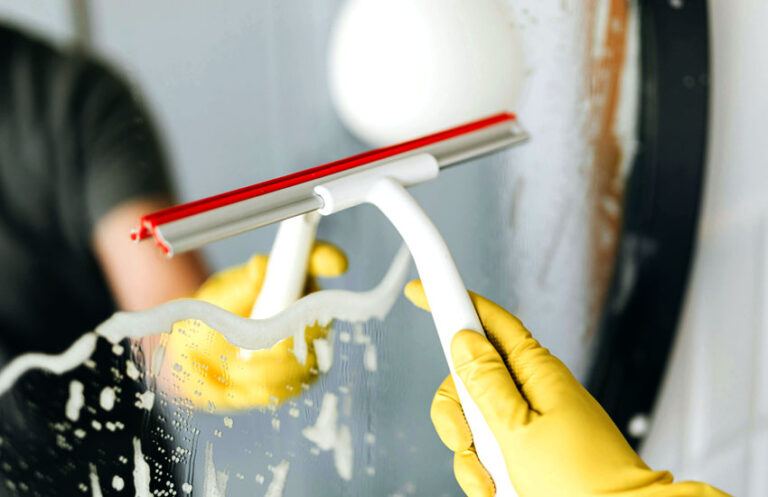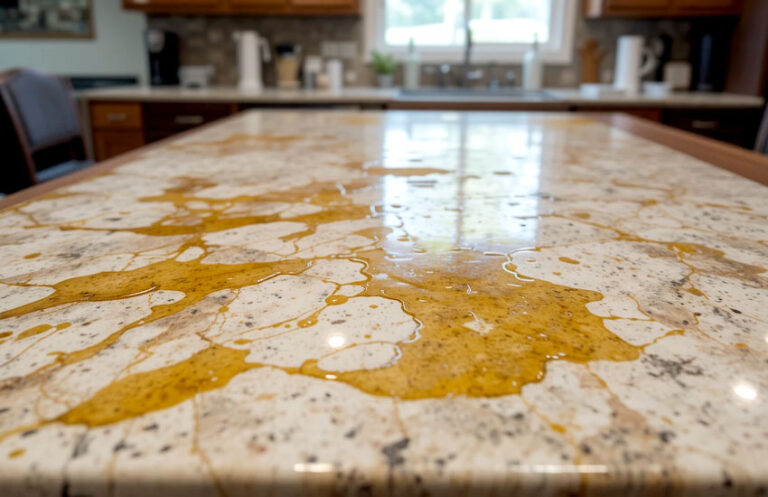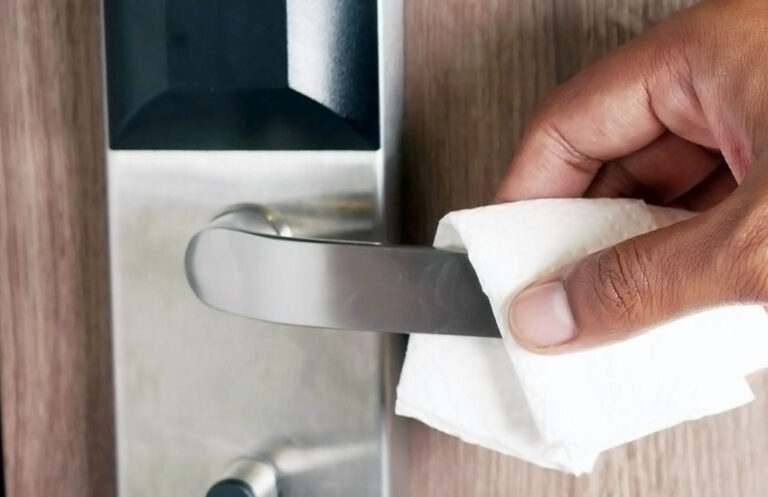As an Amazon Associate, I earn from qualifying purchases at no extra cost to you.
6 Mistakes You’re Making When Cleaning Your Countertops
Cleaning countertops is one of the most important tasks in maintaining a tidy and hygienic kitchen. But even though we clean our countertops regularly, many of us are still making mistakes that could damage the surface or leave behind harmful bacteria. You might think you’re doing it right, but if you’re not paying attention to the details, you might be causing more harm than good.
In this post, we’ll walk through six common mistakes people make when cleaning their countertops and explain how to avoid them. By following these simple steps, you can ensure your countertops remain spotless, safe, and long-lasting.

1. Using the Wrong Cleaner
One of the biggest mistakes you can make when cleaning your countertops is using the wrong type of cleaner. Different countertop materials require different care and cleaning methods. For example, granite, marble, and quartz all need to be cleaned in specific ways to maintain their appearance and integrity.
The Problem with Harsh Chemical Cleaners
If you’re using a harsh chemical cleaner, like bleach or ammonia, on sensitive surfaces like marble or granite, you’re doing more harm than good. These cleaners can strip away the protective sealant, leaving your countertops vulnerable to stains and scratches. Additionally, strong chemicals can also create a lingering toxic smell, which can be dangerous in a kitchen environment.
Granite countertops, for example, are porous, meaning they can absorb moisture and bacteria. Using harsh cleaners on these surfaces can actually cause the granite to degrade over time, making it look dull and worn out. On the other hand, quartz countertops, which are engineered surfaces, require a milder, non-abrasive cleaner to avoid scratching.
How to Choose the Right Cleaner
To avoid making this mistake, always read the care instructions for your specific countertop material. For most surfaces, a gentle dish soap diluted with water will work just fine. If you’re looking for a deeper clean, consider using a specialized cleaner designed for your material. You can easily find products made for granite, quartz, or marble at your local store or online.
For natural stone countertops like granite and marble, it’s a good idea to use a pH-balanced cleaner. Avoid cleaners with acidic or abrasive ingredients like vinegar, lemon juice, or bleach. These can damage the surface and cause discoloration or erosion over time.
For a more eco-friendly option, you can create your own natural cleaner by mixing warm water with a few drops of mild dish soap. This solution works well for most countertop materials and won’t damage the surface.
Special Considerations for Different Surfaces
Here’s a quick guide to help you choose the right cleaner for common countertop materials:
- Granite and Marble: Use a pH-balanced cleaner or mild dish soap with water.
- Quartz: A non-abrasive cleaner, or mild dish soap and water.
- Wooden Countertops: Use a wood-safe cleaner, or a mixture of water and mild soap. You can also occasionally treat the wood with mineral oil to prevent drying out.
- Laminate Countertops: Mild dish soap and water are perfect for laminate surfaces. Avoid anything too abrasive as it can scratch the finish.
By using the right cleaner, you’ll keep your countertops safe from damage and ensure they look great for years to come.
2. Over-Wetting the Surface
When it comes to cleaning countertops, water is essential, but too much water can lead to problems. Over-wetting your countertops can cause damage to the surface, especially for materials like wood or certain natural stones. For instance, wood countertops can swell, crack, or even warp if exposed to excessive moisture for prolonged periods.
The Risks of Over-Wetting
Natural stone surfaces, like granite and marble, are porous, meaning they can absorb water if exposed too long. If water seeps into the pores of the stone, it can cause stains, discoloration, and even weaken the structure of the countertop over time. Additionally, over-wetting can lead to water spots, which are especially visible on glossy surfaces.
In the case of wooden countertops, water exposure can cause the wood to absorb moisture, leading to swelling, cracking, and eventual rot. Wood countertops need to be treated with oils and sealants to protect them from moisture damage, but excessive water can still harm them if not wiped up promptly.
How to Prevent Over-Wetting
To avoid over-wetting, always use a damp cloth instead of a soaking wet one. If you need to use more water for cleaning, make sure to dry the surface thoroughly afterward with a clean, dry cloth. This will help prevent any excess moisture from seeping into the surface.
Another tip is to use a cleaning spray that is specifically designed to evaporate quickly. These sprays can clean effectively without leaving behind excess moisture.
If you’re cleaning wooden countertops, make sure to wipe up any moisture immediately to avoid the wood absorbing it. You can also apply a thin layer of mineral oil to help create a barrier that prevents water from penetrating the surface. This helps keep the wood in good condition for much longer.
3. Scrubbing Too Hard
When we’re cleaning our countertops, we often think that the harder we scrub, the cleaner they’ll get. While a little elbow grease is sometimes necessary, scrubbing too hard can scratch, damage, and even dull the surface of your countertops.
The Problem with Scrubbing Too Hard
If you use abrasive scrubbers or harsh tools like steel wool or scrubbing pads, you can easily scratch the surface of your countertops. This is especially true for softer materials like granite or marble, which are more prone to scratching than harder surfaces like quartz or laminate.
Additionally, scrubbing too hard can cause the protective sealant on stone surfaces to wear away, making it easier for stains and bacteria to seep into the countertop. Over time, this can lead to the countertop losing its shine and appearing worn down.
How to Clean Gently
To avoid this mistake, opt for soft microfiber cloths or sponges that won’t scratch the surface. When cleaning, use gentle circular motions instead of harsh back-and-forth scrubbing. For stubborn spots, try using a soft-bristled brush or a sponge that’s specifically designed for delicate surfaces.
For natural stone countertops, it’s best to use a non-abrasive, pH-balanced cleaner that won’t damage the surface. If there’s a stubborn stain, use a paste made from baking soda and water, which can safely lift stains without scratching the surface.
For quartz or laminate countertops, you can use a soft cloth or sponge with mild dish soap and warm water. These surfaces are less likely to scratch, but it’s still important to clean them with care to maintain their appearance.
By being gentle and mindful of your cleaning methods, you can avoid causing unnecessary damage to your countertops and preserve their beauty for a long time.
4. Neglecting to Disinfect
While wiping down your countertops may remove visible dirt and debris, it’s not enough to ensure they’re truly clean. Disinfecting your countertops is essential to remove germs, bacteria, and viruses that can be harmful to your health, especially in the kitchen, where food is prepared.
The Importance of Disinfecting
When you don’t disinfect your countertops regularly, you leave yourself open to harmful pathogens that can spread to your food and cause illness. This is particularly true in kitchens, where food particles and bacteria are often left behind after cooking and meal preparation.
Even if you think your countertops look clean, germs can still linger on the surface. Disinfecting is essential for creating a hygienic space where you can prepare food safely.
How to Disinfect Properly
To disinfect your countertops, first clean them with warm water and a gentle cleaner to remove any visible dirt. Once the surface is clean, apply a disinfectant that is safe for your countertop material. For example, a diluted bleach solution works well for non-porous surfaces like laminate, but it should never be used on natural stone surfaces, as it can damage the stone and the sealant.
For natural stone countertops like granite or marble, use an alcohol-based disinfectant or a vinegar-water solution in small amounts. Just be sure to wipe the surface dry after disinfecting to avoid water damage.
Another option is to use store-bought disinfecting wipes that are safe for countertops. These can be especially useful for quick clean-ups, but remember to wipe the surface dry afterward to avoid leaving streaks or moisture behind.
Disinfecting your countertops regularly—especially after preparing raw meat or other potentially contaminated foods—is crucial for ensuring your kitchen stays safe and clean.
5. Not Resealing Stone Countertops
If you have granite, marble, or another natural stone countertop, you may have been told to reseal it periodically. However, many people forget to do this, which can lead to stains, damage, and discoloration.
The Importance of Resealing
Natural stone surfaces are porous, meaning they can absorb liquids, oils, and food particles. Over time, the sealant on these surfaces can wear down, making it easier for stains and liquids to penetrate the stone. Without proper resealing, your countertop becomes more susceptible to damage and discoloration.
How to Reseal Your Countertops
It’s important to reseal your stone countertops every 6-12 months, depending on how much use they get. You can tell if your countertop needs resealing by performing a simple water test. Drop a small amount of water on the surface and see if it beads up. If the water is absorbed into the countertop, it’s time to reseal.
Resealing is a simple process that can be done at home with a countertop sealant. Clean the surface thoroughly before applying the sealant, and follow the manufacturer’s instructions carefully. After applying the sealant, let it dry and cure for the recommended amount of time before using the surface again.
By resealing your countertops regularly, you’ll protect them from stains and damage, ensuring they last longer and continue to look beautiful.
6. Ignoring Regular Maintenance
Many homeowners make the mistake of only cleaning their countertops when they look dirty or when they have a spill. However, regular maintenance is essential for keeping your countertops in good shape.
Why Regular Maintenance Matters
Countertops take a lot of abuse, from hot pots to spills and food preparation. Regular maintenance goes beyond simply wiping them down—it includes things like checking for damage, resealing stone countertops, and removing tough stains before they set in.
Ignoring regular maintenance can lead to long-term damage that is harder and more expensive to fix. For example, failing to clean up spills right away can lead to stains that become permanent. Likewise, not resealing natural stone countertops can result in irreversible damage.
How to Stay on Top of Maintenance
To maintain your countertops, make a habit of wiping them down daily, especially after food preparation. Use a gentle cleaner and make sure to disinfect regularly. If you notice any stains, try to remove them as soon as possible before they set.
For natural stone countertops, make sure to reseal them periodically. If you notice any scratches or chips, address them right away before they worsen. And if you have wooden countertops, consider applying a new coat of oil every few months to keep them looking great.
By staying on top of regular maintenance, your countertops will continue to shine and serve you well for years.
I hope this post has helped you understand some of the most common mistakes people make when cleaning their countertops and how to avoid them. By choosing the right cleaner, using gentle methods, and taking care of your countertops through regular maintenance and resealing, you’ll ensure that your kitchen surfaces remain in excellent condition.
Are These Questions in Your Mind?
Is it okay to use vinegar on granite countertops?
No, vinegar can damage the sealant and the surface of granite countertops, so it’s best to avoid it.
Can I use a multi-surface cleaner on my marble countertops?
No, marble requires special care, and using a multi-surface cleaner could damage the stone.
Do I need to reseal quartz countertops?
No, quartz countertops are non-porous, so they do not require sealing like granite or marble.
Is it safe to use abrasive scrubbers on laminate countertops?
No, abrasive scrubbers can scratch and damage the surface of laminate countertops.
Can I clean my countertops with bleach?
It depends on the material. For non-porous surfaces like laminate, bleach is fine, but it should never be used on natural stone.
Is it necessary to disinfect countertops every day?
Ideally, yes. Especially in the kitchen, disinfecting daily helps reduce the spread of germs and bacteria.
Can I use soap and water on marble countertops?
Yes, mild soap and water are safe for marble countertops. Avoid harsh chemicals.
Do I need to worry about moisture on wood countertops?
Yes, moisture can damage wood countertops, so it’s important to wipe up spills immediately.
Is it safe to use essential oils to clean countertops?
It can be, but you should dilute essential oils properly and avoid using them on stone surfaces that may absorb them.
Can I use a microfiber cloth to clean all types of countertops?
Yes, microfiber cloths are generally safe for most countertop materials, as long as they are used gently.





